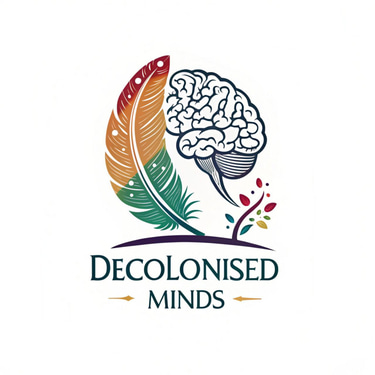Understanding Cultural Identity in Mental Health: A Decolonised Psychotherapy Perspective
Understanding cultural identity is critical to fostering mental health and personal growth. This approach acknowledges the enduring impact of colonialism and systemic oppression on marginalised communities, emphasising the need for culturally responsive and empowering therapeutic practices.
By Talha AlAli, Founder of Decolonised Minds
1/22/20251 min read
Cultural identity forms a core aspect of an individual’s sense of self, encompassing shared values, traditions, and histories passed down through generations. Within the lens of decolonised psychotherapy, understanding cultural identity is critical to fostering mental health and personal growth. This approach acknowledges the enduring impact of colonialism and systemic oppression on marginalised communities, emphasising the need for culturally responsive and empowering therapeutic practices.
In traditional Western psychotherapy, cultural identity has often been overlooked or reduced to surface-level considerations, leading to feelings of alienation among clients from diverse backgrounds (Sue et al., 2009). Decolonised psychotherapy, by contrast, centres cultural identity as a source of strength and resilience. It encourages practitioners to explore how historical, social, and political contexts have shaped their clients’ experiences, thereby promoting deeper understanding and healing.
For many, a disrupted sense of cultural identity—due to colonisation, forced migration, or systemic racism—can exacerbate feelings of disconnection, low self-worth, and even trauma (Gone, 2013). Therapists adopting a decolonised framework aim to validate these struggles while supporting clients in reconnecting with their cultural heritage. Practices such as storytelling, traditional rituals, and community engagement can foster healing and empowerment.
Furthermore, recognising cultural identity allows therapists to address the power imbalances inherent in the therapeutic relationship. By adopting cultural humility and co-creating goals with clients, practitioners create a safe, collaborative environment where clients can reclaim their narratives and strengthen their sense of self (Tervalon & Murray-García, 1998).
Ultimately, prioritising cultural identity within psychotherapy enriches the therapeutic process and honours clients’ holistic well-being, paving the way for authentic personal growth and mental health.
References
• Gone, J. P. (2013). Redressing First Nations historical trauma: Theorising mechanisms for Indigenous culture as mental health treatment. Transcultural Psychiatry, 50(5), 683–706.
• Sue, D. W., Capodilupo, C. M., & Holder, A. M. B. (2009). Racial microaggressions and their power to harm. American Psychologist, 64(3), 220–231.
• Tervalon, M., & Murray-García, J. (1998). Cultural humility versus cultural competence: A critical distinction in defining physician training outcomes in multicultural education. Journal of Health Care for the Poor and Underserved, 9(2), 117–125.
